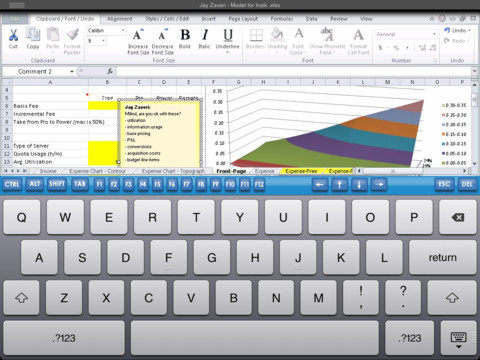
Got iPad and need Microsoft Office? Try CloudOn
There are a number of Office compatible office suites to choose from in Apple's App Store, so anything that wants to stand out from the crowd needs to offer something special. After a brief appearance followed by a rapid vanishing act, CloudOn for iPad has returned to the App Store. What makes this app different from any of the other suites you could choose to install? Well, not only is it free of charge, but the suite is not only Office-compatible, it is a cloud-based version of Microsoft’s flagship suite.
The app integrates with Dropbox that is used to store all of your documents, and you have access to Word, Excel and PowerPoint. The app interface is almost exactly the same as using the desktop version of Office, but working with an on-screen keyboard is vastly different to typing in the usual way. It is unlikely that you will want to use the app for extended periods of typing, but the ability to review existing documents and make changes to spreadsheets, presentations and text documents in a familiar environment is big news.

Backup to most cloud services with Duplicati
While cloud storage may have taken off in a big way, most backup tools are yet to catch up: if you can save your target files to anything more than an FTP server then you’re probably very lucky.
Some backup utilities are now giving you more options, though, and Duplicati is a great example, with the program supporting backups to Amazon S3, Windows Live SkyDrive, Google Docs, Rackspace Cloud Files, WebDAV and FTP servers, as well as local and network drives. And that’s just the start of the program’s many configuration options.

Is 2012 year of the cloud?
Forrester analyst Holger Kisker seems to think it is. Today he blogs: "2012 is the year the cloud becomes mature". It's also the year we're all supposed to die, if you believe ancient Mayan predictions. But December is that time when analysts peer (should that be leer?) into their crystal balls and prognosticate about the year ahead.
Kisker offers 10 reasons, but doesn't serve meat and potatoes until No. 6: "The total cloud market (including private, virtual private, and public cloud markets) will reach about $61 billion by the end of 2012. By far, the largest individual cloud market continues to be the public SaaS market, which will hit $33 billion by the end of 2012". Those are big numbers.

Mendeley: where academic research meets the cloud
The world of academia and research thrives on organization and collaboration. And when it comes to keeping your research, notes, journals and other documents in order, Mendeley is just the service you need.
It’s cloud-based, allowing you to not just back up and sync your research library online and across multiple computers via the cross-platform Mendeley Desktop tool and Mendeley (Lite) for iPhone and iPad, but you can also collaborate with others, too, thanks to the tools it provides in conjunction with its group sharing capabilities.

Going to the cloud has its benefits, but it won't save you much money
The prospect of cost savings is touted as a significant benefit of cloud computing, but a new study disputes that argument. More than one-third of US businesses employing the cloud save less than $20,000, according to the study commissioned by IT consultation firm CSC. Nearly one-quarter saved nothing. Going to the cloud does not reduce the size of IT departments generally: only 14 percent report a reduction in tech workforce, while one-fifth actually expand the number of employees in IT through the hiring of consultants.
Cloud computing was recently touted by former US chief information officer Vivek Kundra as a method to save the federal government some $5 billion annually. If CSC is right, Kundra's claims are way off, and actually may cost taxpayers far more.

Our holiday gift to you: 75% off AVG LiveKive cloud storage
As long as you have a fast Internet connection, then nothing quite beats the convenience of online backups. There are no network issues to worry about, no discs to prepare: just set up the backup client and it’ll automatically transfer whatever files you’ve specified at the appropriate time. And better still, by backing them up offsite you’ll guarantee their survival, even if your home is hit by a disaster like a burglary, or a fire.
Of course most online backup services fully realise their advantages, and so will charge sizeable amounts of money to open an account for anything other than the most trivial amount of server space. But it doesn’t have to be that way. And if you’re looking for an online backup bargain, then we just might have one in the shape of AVG’s LiveKive 2012.

HP makes major push in Hybrid cloud services
IT solutions leader Hewlett-Packard has been very deliberate about its belief in Hybrid cloud solutions; that is, solutions that integrate public and private cloud solutions into a single, more controlled package. It was one of the top three company priorities erstwhile CEO Leo Apotheker outlined earlier this year, for which the company has set aside $2 billion in financing.
This week at HP Discover 2011 in Vienna, Austria, HP announced a series of additions to its cloud solutions portfolio many of which utilize this hybrid architecture and integrate solutions from HP's partners, as well as logistical solutions such as consultation, education, management, testing, and training.
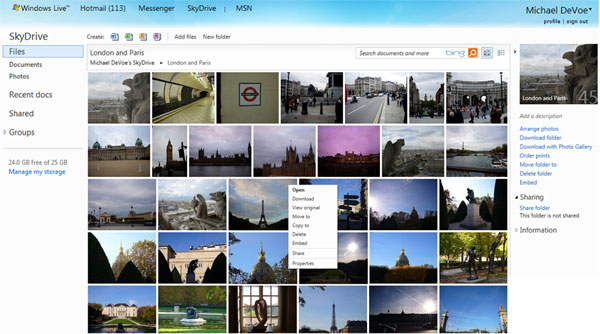
Small businesses embrace Microsoft's cloud, while enterprises wait and see
If you live in Seattle, it's hard not to think about clouds. The mean number of cloudy days a year is 255.5, with another 81.6 partly cloudy. That's a whole lot of overcastness (go ahead, tell me that's no word). Perhaps the skies above remind Microsoft employees below about the importance of "the cloud" to the company's future. Today, Microsoft reminded everyone with some stats on its cloud computing progress and updates to Office 365 and SkyDrive. However, beneath today's announcements there are signs of drought, with only a small number of enterprises embracing Microsoft's cloud.
The Redmond, Wash.-based company is enhancing both services and has broadened availability, 22 more countries -- including Argentina, Iceland, Indonesia, South Africa and Taiwan -- for Office 365. SkyDrive gets a modern makeover, including HTML5 enhancements that are in line with broader Microsoft development objectives for Internet Explorer 10 and Windows 8.

Ashampoo Burning Studio 11 treats cloud and desktop the same
Ashampoo’s Burning Studio has never made quite as many headlines as the big disc burning suites, perhaps because the program concentrates on ease of use rather than forever adding unnecessary "bonus"features that you’ll never use.
The package still manages to include interesting capabilities that you won’t always find elsewhere, though, like the ability to create interactive autostart menus for your data discs. And the latest release, Ashampoo Burning Studio 11, continues this tradition with easy and time-saving integration for your Facebook, Dropbox, Picasa and Flickr accounts.

The Cloud isn't elastic enough
By now, we all can see that the Internet will become the dominant media distribution platform.
We can easily imagine (and expect) that all content will be digitized and distributed online. Every song, every movie, every video game, every software program, every live television event, every business document and more will be instantly searchable and retrievable via a range of connected devices. It will all be magically available to stream or download on-demand through "the Cloud".
This was the dream when I started my first Internet business in 1995. Now, people think it is the reality. And, while we are making great progress towards such a future, unfortunately, we are not there yet. The demand for online media consumption is simply too great and is growing even faster than we can deploy cloud services to meet it.

Would you pay $299 for Google Chromebook?
"Beginning this week Acer and Samsung Chromebooks will be available starting at $299", Googler Venkat Rapaka blogs today. Is that price low enough for you or perhaps as present for a relative? For $100 more than Kindle Fire, you get a keyboard, double the storage (16GB vs 8GB), similar cloud connected benefits, comparable battery life and bigger display. Well, I had to ask.
If you want to answer, fire off in comments. This is a serious question. Because there is a right price, one making Chromebook an appealing alternative to a new laptop or tablet. Before the price cuts, Acer and Sumsung models started at 349.99. Some commenter surely will claim price cuts are sure sign Chromebooks aren't selling well. Oh yeah? Consider this: Samsung is releasing a black Series 5 Chromebook (to go alongside grey and white ones) and prices fall for lots of reasons, such as economies of scale when products sell well, lower component prices or holiday prices. Reasons aside, is $299 low enough for you?
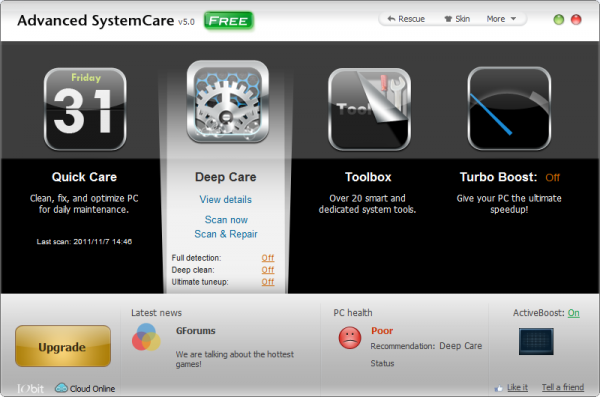
Advanced SystemCare 5: Faster, smoother PC management
IObit has launched version 5 of its all-encompassing PC maintenance, optimization and security suite. Advanced SystemCare 5 sees the debut of ActiveBoost technology, a background process that aims to keep the computer running smoothly through intelligent management of system resources.
Advanced SystemCare features a new cloud-based database for up-to-the-minute updates, redesigned user interface and enhanced Quick and Deep Care modules. The system tool has also been rewritten with a brand new architecture and source code to extend compatibility to both 32- and 64-bit operating systems.

Datacenter density is your destiny
In `80s classic movie "Back to the Future", young George McFly approaches Lorraine Baines and flubs his introduction. Meaning to say "I'm your destiny", McFly nervously utters: "I'm your density". For business of all sizes, density is their destiny as they look ahead to the post-PC era and either acquiring or outsourcing massive datacenter capacity.
The three years ahead will be tumultuous, as businesses look to balance converging and contradictory priorities as they rush to the cloud, or sometimes not. Any organization offering connected services -- whether to employees, business to business or business to consumer -- must think about expanding density as their destiny. Should they consolidate server capacity through virtualization, build datacenters or outsource capacity to cloud providers such as Amazon and Microsoft? There is no stock answer, because businesses' different sizes, global or local reach, IT budgets or operational needs vary so vastly. But there are trends that will hugely affect decision-making.
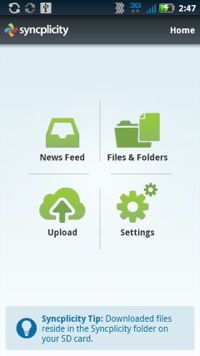
Syncplicity launches new cloud file sync and management app for Android
There is no shortage of cloud file sharing and sync services today, and most of them focus on mobile accessibility: Dropbox with Dropsync, Box.net, SugarSync, YouSendIt…there are tons of options.
As a user, strong competition among service providers is a wonderful thing, so it's a great time to be a user of cloud file management systems.
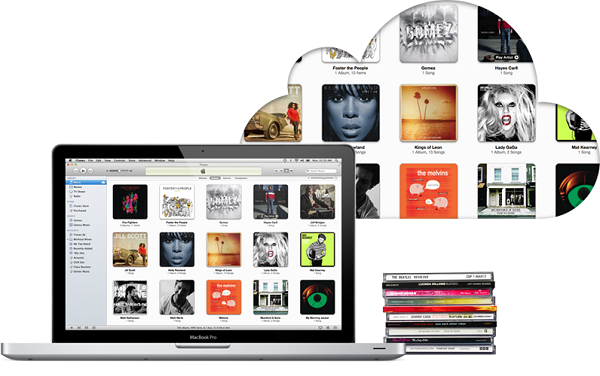
Apple releases iTunes Match to US subscribers
Apple has pushed out the latest version of its media player and management software -- iTunes 10.5.1. The latest version of the app is not big news in itself, but the release coincides with the much anticipated launch of iTunes Match, in the US market at least. The service has been expected for some time, but a series of delays pushed the release date back slightly. Now, at long last, iTunes Match is here.
The subscription service will set you back $25 per year and enables you to access your entire music collection in the cloud. The latest version of iOS has seen Apple expressing a greater interest than ever before in life in the cloud and this foray means that it will now be possible for those willing to stump up the annual fee to access their music collection from any internet connected device without the need for manually copying of files.
